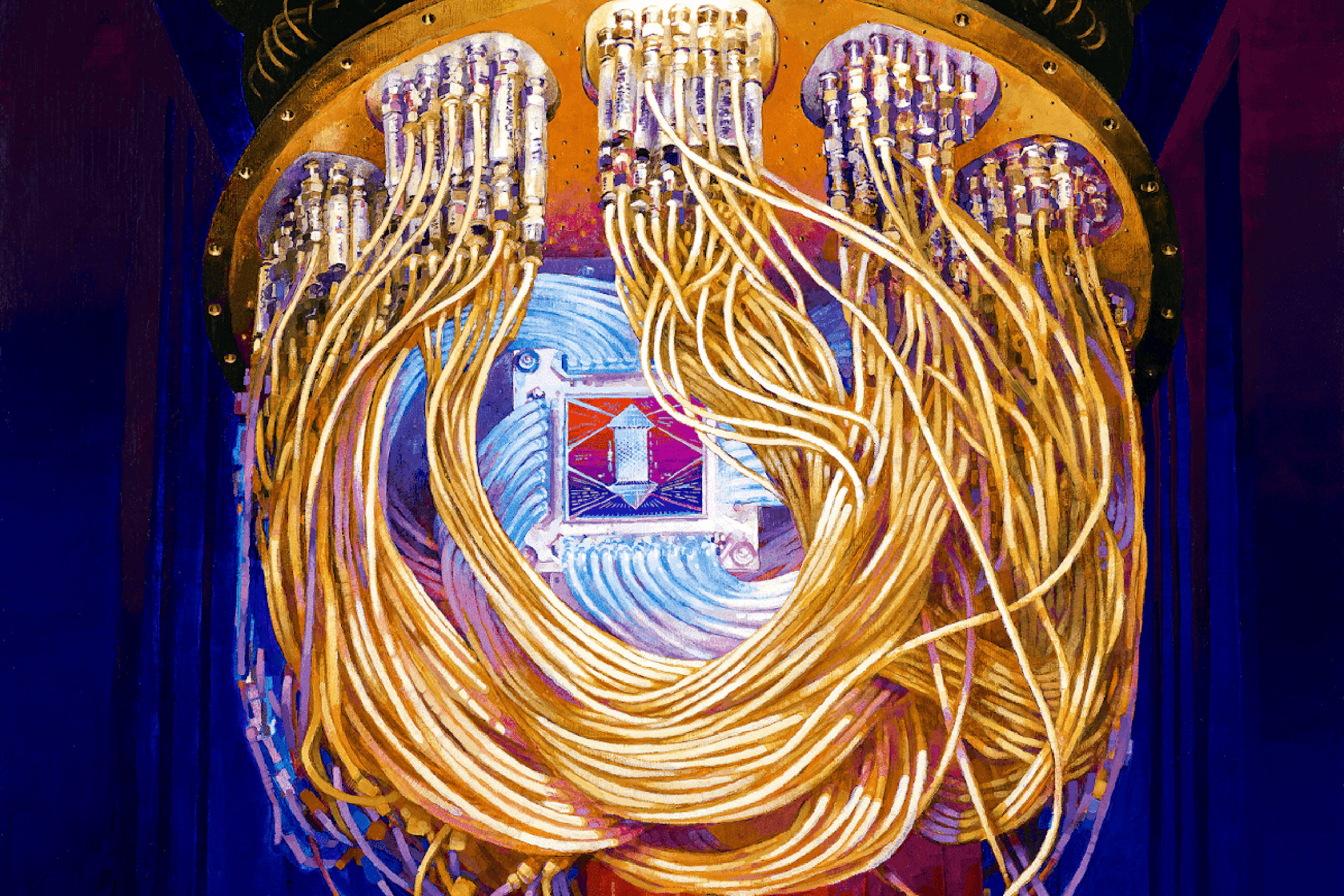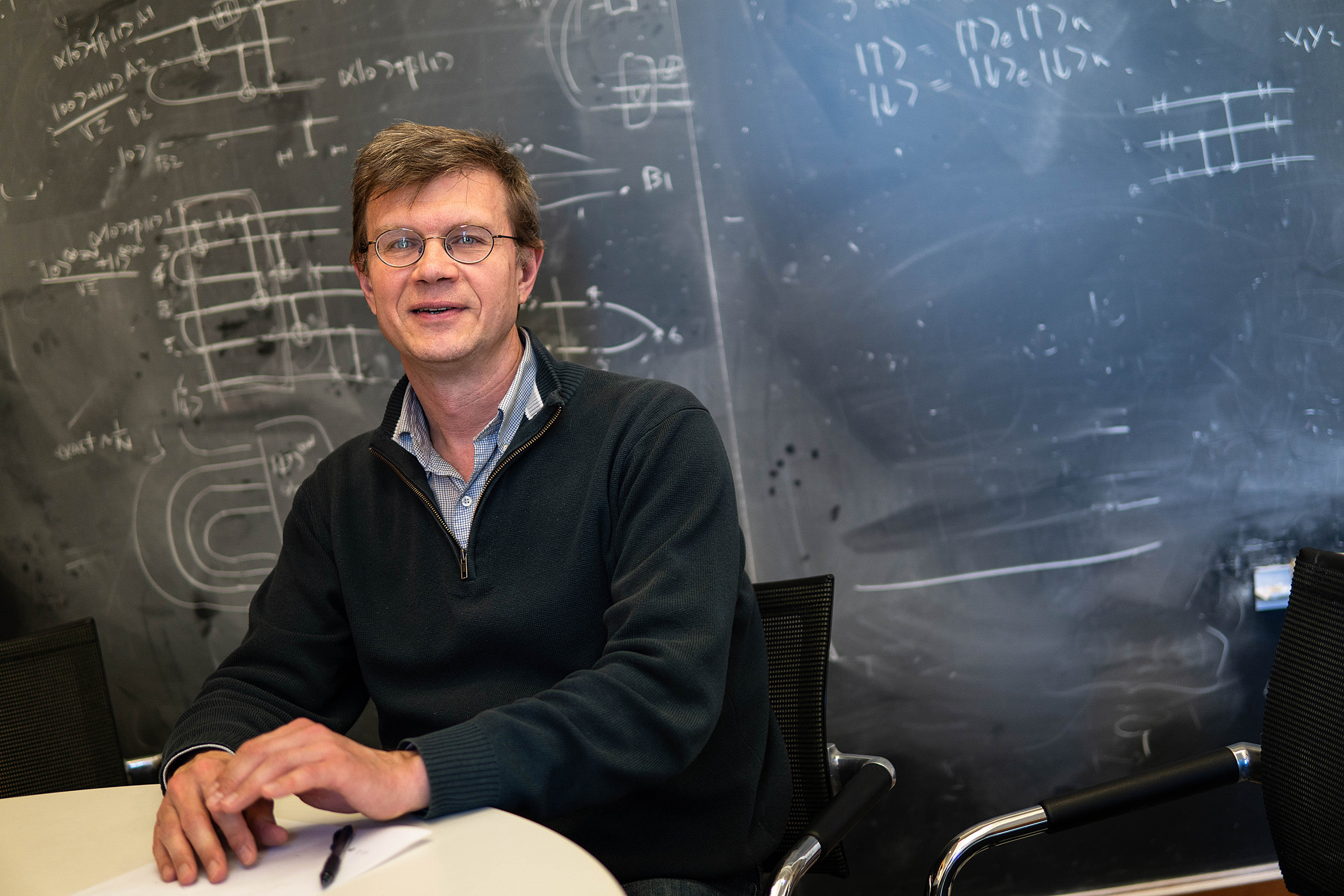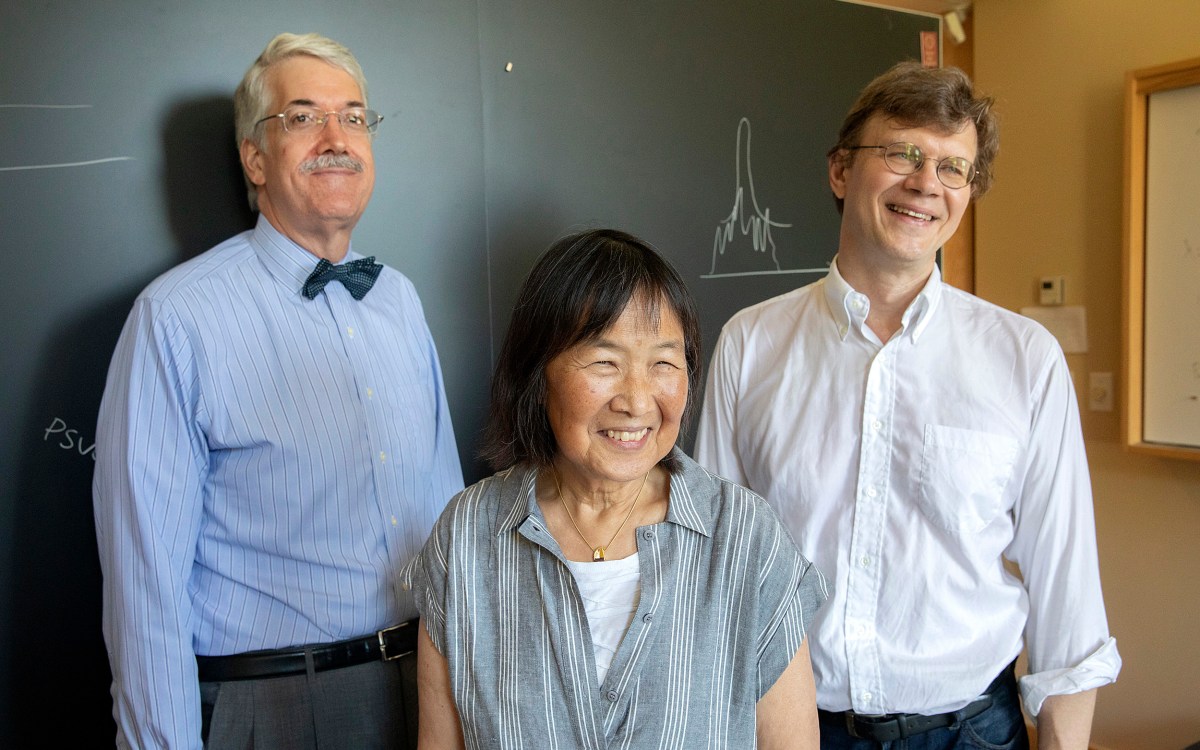
An artist’s drawing of Google’s quantum computer chip, called Sycamore, and its surrounding hardware.
Forest Stearns/Google AI Quantum Artist in Residence
Riding the quantum computing ‘wave’
Harvard Quantum Initiative Co-Director Lukin on ‘quantum supremacy’ and Google’s announcement of its achievement
The computing world was abuzz last week after Google scientists announced they’d passed a key threshold in which an experimental quantum computer solved a problem in just minutes that a classical computer would take years —10,000 by Google’s count — to solve. The pronouncement, later disputed by scientists at rival IBM, was widely hailed as proof that quantum computers, which use the mysterious properties of matter at extremely small scales to greatly advance processing power, can — as theorized — exhibit “quantum supremacy” and vastly outperform even the world’s most powerful classical computers.
At Harvard, George Vasmer Leverett Professor of Physics Mikhail Lukin watched the announcement with interest, in part because he — together with collaborators from Harvard and MIT — already built a quantum machine of similar power to Google’s and used it to solve scientific problems. Lukin, who co-directs the Harvard Quantum Initiative, spoke with the Gazette about the week’s quantum computing news.
Q&A
Mikhail Lukin
GAZETTE: What is “quantum supremacy” and why is it important in talking about quantum computing?
LUKIN: Let me first describe quantum computers. They constitute a new approach to processing information, one that makes use of the laws of quantum mechanics, the discipline of physics that describes the behavior of particles at a microscopic level, of atoms, of nuclei.
GAZETTE: Does it take advantage of differences in behavior at those very tiny scales from what we might expect in the macro world?
LUKIN: It takes advantage of differences in behavior and in particular one very strange feature of the quantum world. That is that objects can be in several different states — in several different places — at once. That sounds very bizarre, but in the quantum world, an object can be in your office and in my office at the same time. Even though it sounds strange, this idea of quantum “superposition” has been confirmed and it’s been routinely studied in experiments involving microscopic objects like single atoms, for example, over the past century.
GAZETTE: Now, this is not a new idea, or even — at this point — a revolutionary idea because it’s actually used in certain applications that people see every day, right?
LUKIN: Yes. Even certain technologies such as magnetic resonance imaging (MRI) are based on this idea of superposition. So when you get an MRI in the hospital, superposition is being used. Superposition seems bizarre because these effects do not occur in the macroscopic world. Quantum superpositions of microscopic objects are extremely fragile and susceptible to any kind of environmental perturbation. A single photon hitting quantum superposition can cause it to collapse. That means when you look at it, you will always find an object in one place or another. The idea of quantum computing is to make use of these superpositions for massively parallel processing of information. If you were to use a classical computer, you’d code your information in a string of zeroes and ones. In a quantum computer, you can prepare a state that has all sorts of combinations of zeros and ones, it can be in one state, and in another state, and in yet another state all at once. Then, as long as it’s quantum mechanical, as long as it can preserve this superposition, it can process all of these inputs simultaneously. And that massive parallelism gives rise to a very powerful computer.
“Even Google’s team will agree the real goal now is to show some examples where quantum computers can be useful either for scientific applications or for general purpose applications.”
Mikhail Lukin
GAZETTE: What is the threshold of “quantum supremacy” that Google said it passed last week?
LUKIN: This massive parallelism enables one to exponentially speed up quantum computation over classical computers. Quantum bits are the analog of bits in a classical computer, and are used to store a superposition state. So, even if a quantum computer has just 50 quantum bits, which seems very small, it is very challenging for a classical machine to simulate it. And the reason is that even 50 qubits in a superposition state can store and process exponentially many more combinations at once. If you had a system of 300 qubits, you could store and process more bits of information than the number of particles in the universe. So this idea of supremacy is that you build a system large enough, quantum enough, and programmable enough that you can execute operations that the best possible classical computer just cannot simulate in any kind of reasonable time.
GAZETTE: In this specific case we’re talking about a quantum computer with 53 qubits. How big is it physically? How would it compare to, say, a supercomputer?
LUKIN: In terms of physical size? It is a room full of equipment. Something like the Summit supercomputer in Oak Ridge National Lab. It’s probably comparable.
GAZETTE: But it has exponentially more computing power?
LUKIN: That’s the hope. If you have a 50-qubit system and run it long enough to execute a general enough algorithm, it will be very, very challenging for the best classical computers to catch up. And if they can catch up, you could just add a few more qubits — above 60, 70, or 100 — and it’s very clear that it will be completely impossible for a classical computer to catch up.
GAZETTE: IBM, which is a competitor, cast doubt on Google’s achievement. Do you have a sense as to who’s right or who’s wrong here?
LUKIN: Google’s achievement is quite impressive. But it points to one specific calculation and says, “We crossed the threshold.” I think, in practice, it’s not quite like that. There is no doubt that once quantum computers become large enough, classical computers cannot simulate them. That’s very clear. It is also clear that 50 qubits is a sort of threshold and the system that they built is very competitive with the best systems that exist around in the world, including one here at Harvard. What they’ve done is a great example of how to test for this so-called supremacy idea. However, 50 or so qubit systems already have been used in other labs, including ours, for the past two or so years. There have been a number of experiments done with systems of that scale which classical computers have a hard time catching up to. In this sense, I would describe what’s going on now as not a singular event but more like a wave that is coming. It might be that IBM folks found an algorithm to efficiently simulate on a classical computer what the Google quantum computer did. I’m not surprised by that, but at the same time, it’s very, very clear that we’re entering, as a community, a place where no one has ever been before, meaning we can do things much faster than the classical computers. It is actually happening.
GAZETTE: What was the problem that Google was trying to solve?
LUKIN: The specific problem that Google is trying to solve is akin to generating random numbers in a quantum way. The algorithm they’re using is not designed to be practically useful. So in this practical sense, quantum supremacy by itself, to me, does not mean very much. But what will be really exciting — and this is a key goal in the field — is achieving that quantum advantage for things that are useful. You execute the algorithm and actually learn something. There are two types of useful quantum advantage, one for scientific applications and the other for general purpose applications. Google’s paper is something in between.

“Google’s achievement is quite impressive. But it points to one specific calculation and says, ‘We crossed the threshold.’ I think, in practice, it’s not quite like that,” says Professor Mikhail Lukin, co-director of Harvard’s Quantum Initiative.
Photo by Sophie Park
GAZETTE: Purely for demonstration purposes?
LUKIN: Yes, it is a demonstration experiment. However, in the domain of scientific applications, it is pretty clear that quantum computers will be very useful for simulating complex quantum systems. This is what we have focused on here at Harvard. In fact, using our system, I believe that we’ve already crossed into the domain where we have useful quantum advantage for scientific applications. Using our 51-qubit system, we have made one of the largest quantum superposition states, and we have already discovered new phenomena that have not been known previously, and that you would not be able to uncover using brute force classical simulations. In fact, here at Harvard, in different labs, we have at least two systems which have either entered or are entering this domain [of quantum supremacy] for scientific applications. And I think it’s very significant, because these experiments are already creating value for the scientific community.
GAZETTE: So, if the definition of quantum supremacy is to do things much faster or that classical computers can’t do, you’re there already?
LUKIN: That’s right. You could argue that these are not problems that people on the street will care about, and I’m sensitive to that. Another goal, which is exciting and I think we are now in a unique position to tackle, is to look for quantum advantage with practical relevance. That may be one of IBM’s points, and I agree with it. Even Google’s team will agree the real goal now is to show some examples where quantum computers can be useful either for scientific applications or for general purpose applications.
GAZETTE: Do you see a future where quantum computers replace classical computers in everyday life, in smartphones and laptops? Or is it going to be the case where quantum computers will be very valuable for specific things and classical computers will continue to be valuable for other things?
LUKIN: It’s very hard to predict the future. But my best guess would be that it’s the latter: that quantum computers would be used as accelerators for problems that are very hard for classical machines.
GAZETTE: So, when you think about big problems that are really hard, are you thinking about things like modeling climate or fusion research, or are you talking about other things like what you use yours for: to understand something horribly complex like quantum mechanics itself?
LUKIN: I’m tempted to answer “all of the above.” There are different classes of problems. For example, understanding complex materials and modeling chemical reactions are problems that are fundamentally quantum mechanical, which is why classical computers have such a hard time solving them. Understanding how complex quantum systems behave far away from the equilibrium and looking for new phases of matter, these are the kinds of problems for which we are already using a quantum advantage. This work has already stimulated many research directions. There are other problems that push the boundaries of what it is possible to do with conventional computers, like modeling the climate or complex optimization — finding optimal arrangements for networks, for signal routing, finance, logistics, artificial intelligence. It’s our hope that quantum computers will eventually accelerate calculations relevant to these problems. Another famous problem is factoring, related to encryption. When you encode your credit card numbers, you currently use so-called RSA encryption, which is based on the difficulty of problems like finding the factors of a large number. For problems like these there are quantum algorithms that can be exponentially faster than the best-known classical algorithms. At the same time, quantum computers can actually be used to improve security of communications channels — this is another example of a useful quantum advantage.
GAZETTE: Can you talk about some of the challenges you see ahead?
LUKIN: It is important to emphasize two points: We still do not know how to build truly large-scale quantum machines, containing many thousands of qubits. There are several approaches to this problem that have to be investigated seriously, but we do not know at the moment what a truly large-scale quantum computer will ultimately look like. The second issue, which we have already discussed, is that we still do not know for which applications quantum computers will be most useful. This field is at a unique point where a lot of basic research still has to be done, but some systems are ready to be engineered and deployed, though at a relatively small scale.
GAZETTE: I want to touch on the community working in this area and the Harvard Quantum Initiative. How old is it now?
LUKIN: It’s about a year old. We have, between Harvard and MIT, a very special community of researchers looking at various aspects of this frontier. There are around 40 research groups in an extremely collaborative community that really spans these two institutions and several startup companies. Many of these groups are already world leaders in their respective disciplines and when they work together, something very special can happen. This is also a unique opportunity for educating students, who will eventually become leaders at the forefront of this exciting interdisciplinary field. Enabling these collaborations and educating a new generation of quantum scientists and engineers are the key goals of Harvard’s Quantum Initiative. Our work on quantum computers is an example of such truly collaborative projects between theorists, experimentalists, engineers, and computer scientists from both of our institutions — this is our competitive advantage, our “secret sauce.”









